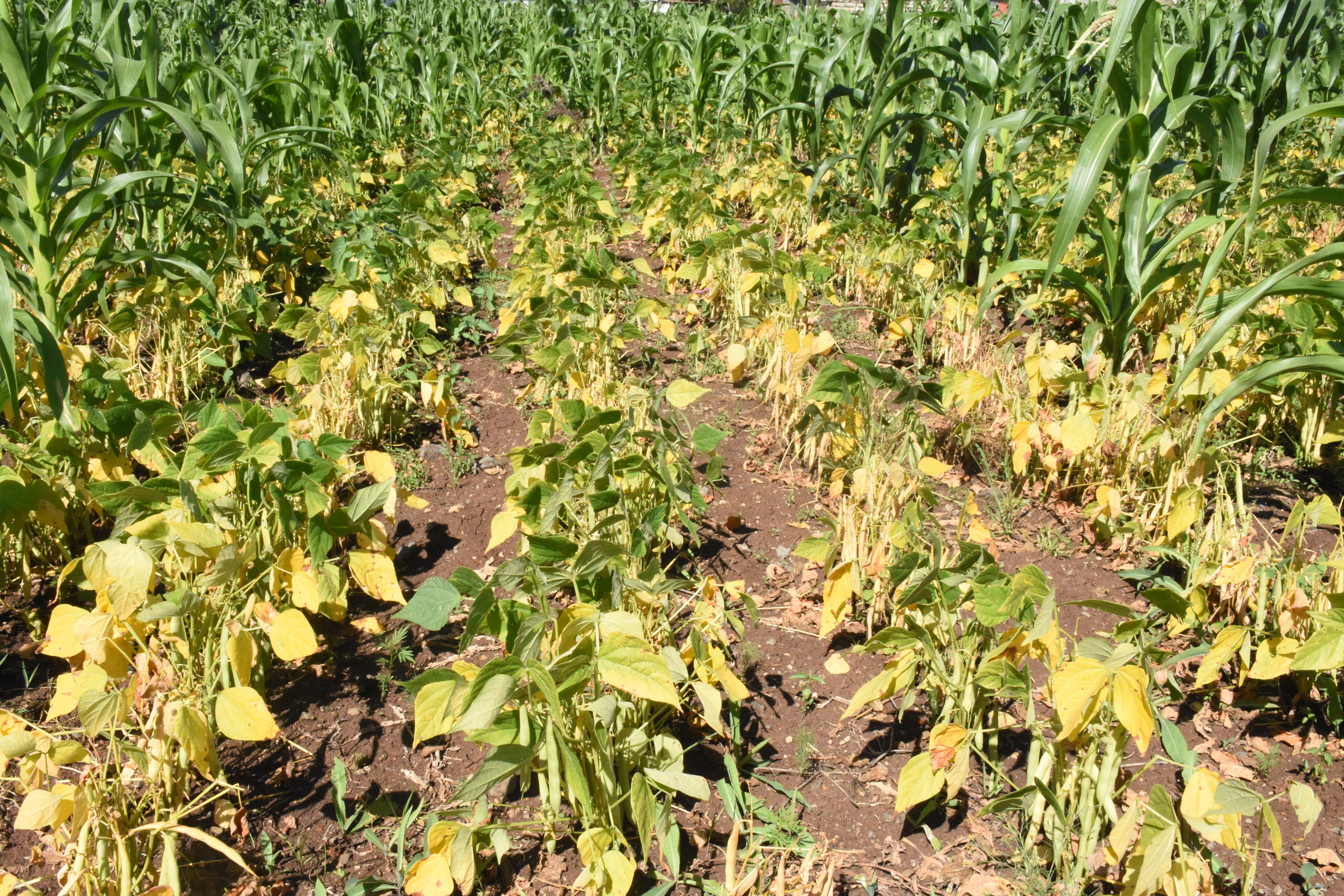Bean production initiative at Mwireri Secondary School started in 2017 with a small demonstration to assess the suitability of two varieties for the area. From the success observed, the school has now taken up bean production as one of its self-sustaining enterprises. The school currently grows beans on one-acre piece of land intercropped with maize and sometimes rotated with maize and Irish potato.
The school’s bean demonstration farm has continued to serve as a learning site for the community. Parents visiting the school are often taken on a tour of the farm to see how beans are performing. The farm manager and the headteacher are always available and ready to share information on the bean varieties on promotion. There has been growing interest in bean production by the community.
The demonstration plots at the school and the farmers’ fields comprise of various improved bean varieties among them drought tolerant bean varieties such as KATX 56 (Red kidney), KAT B1 (Yellow bean), KATX69 (Red mottled) from Kenya Agricultural Livestock Research Organization ( KALRO) Katumani and two root-rot resistant varieties KK8 and CAL194 both red mottled bean from KALRO Kakamega. For the first time, the farmers also evaluated the newly released high iron and zinc bean varieties Nyota, Angaza and Faida from KALRO Katumani.
‘Since we started the bean farming, we have noted a great transformation at the school. We are now self-sufficient in bean production and have cut down on the expenses of buying beans for our school lunch feeding program. Because of the assured meals at school, we have seen a drastic improvement in school attendance and retention. Every student in the community wants to study at Mwireri Secondary School’. These are the sentiments by Mr. George Murage, the Principal as he leads us through the bean farm.
Mr. Murage proudly talks about the previous season success where out of growing seven (7) kg of certified seed, the school was able to harvest six- 90kg bags of red kidney bean (KATX56). This seemed like a miracle since it was the first time the school was growing beans on the farm. Many farmers in the area have abandoned bean farming due to poor yields. The good productivity has motivated the school to continue growing beans on the one-acre piece of land to meet the needs of the school feeding program.
The choice of beans was also influenced by the need to diversify the previously carbohydrate-laden diet to make it more nutritious. Beans are a major source of protein and micronutrients and it complements a diverse range of foods. Because of their own production, the school has increased the food proportion served together with maize (Githeri), rice and Irish potato. The cost of meals paid by parents has reduced drastically.
‘Bean production has great potential to contribute to achieving The Big Four Agenda of the Kenya Government, more so the pillar on Food and Nutrition Security’, observed Mrs. Julia Kamau the area Chief. She noted that bean production is a profitable enterprise that can help create jobs for the many idle people in Mwireri community. An economically productive and active community will reduce incidences of crime. The message should be spoken about through the community baraza so that many more people can learn about the new bean production technologies.
The biggest challenges to bean production in this area has been unpredictable rainfall especially during the short rains period between October – December. For example, this past season the rains started in November as opposed to October. Further, the rains were erratic and ceased at the critical stage of bean flowering leading to poor pod formation. Explore opportunities for water harvesting and irrigation are viable ways to ensure supply of water is sustained. The dry weather also resulted in high incidences of pests mainly aphids and pod borers, which caused damage and demanded repeated spraying with pesticides. In some sites, diseases such as anthracnose and angular leaf spot were observed. Farmers raised concerns about lack of access to improved seed since there is no seed stockist in the area. A local agro-dealer system to facilitate quick access to improved bean seed by the farmers is essential.
Dr. Boaz Waswa- a Soil Scientist at CIAT who has been working with the groups in Mwireri shed some light on the ingredients for the success of the initiative. He observed that agriculture is knowledge-intensive and sharing information and building local capacity in bean production is key in ensuring ownership by the school and farmers. Self-driven organized farmer groups are better positioned to learn from each other and grow their agro-enterprises. It is also easier and cheaper to provide technical and extension support through groups compared to working with individual farmers.
From the initial one group, 25 other groups have expressed interest in bean production. The bean actors have formed a Nyeri Bean Platform WhatsApp group where information is exchanged and extension support provided by the CIAT and KALRO experts. This has eased the cost of travel to provide technical support as problems can be discussed and solutions provided online and remotely. The farmers have within the group a trained agri-chemical expert who provides timely advice on how to manage diseases and pests.
Bean farming is able to contribute not only to food and nutrition security but also improve education, trade, employment, and security. These are important nodes of community transformation.

